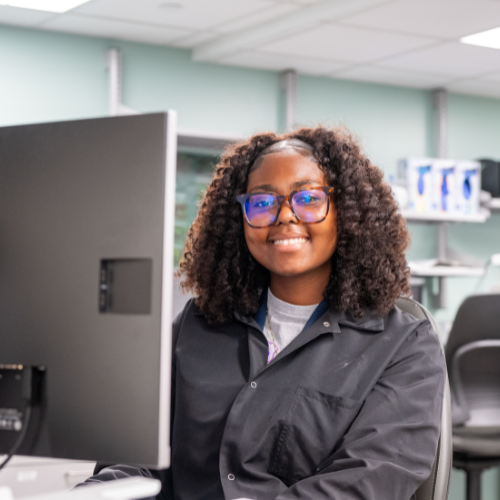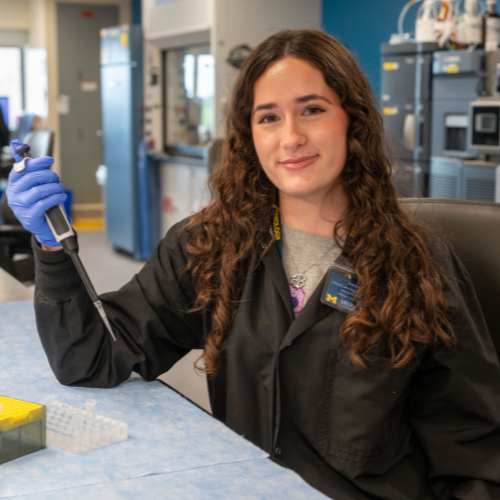

One of the sections of Pathology’s Division of Education Programs and Communication is our Allied Health Education section, where students from other universities rotate through our laboratories on internships as they prepare for careers as medical laboratory scientists. Two of these students currently rotating in our laboratories from Michigan State University discovered unexpected common ground.
 Cynthia Nnko was born in Tanzania and emigrated to the United States when she was ten years old. “I still remember my life in Tanzania, although I grew up in Holt, Michigan after my mom married my stepdad, although I call him my dad because he raised me. He had a job at Michigan State University.”
Cynthia Nnko was born in Tanzania and emigrated to the United States when she was ten years old. “I still remember my life in Tanzania, although I grew up in Holt, Michigan after my mom married my stepdad, although I call him my dad because he raised me. He had a job at Michigan State University.”
 “I grew up in East Grand Rapids, Michigan my entire life, so nothing quite so interesting,” laughed Katie McGraw. Katie has had a lifelong fascination with science, which she began to explore when she received a microscope for Christmas at just six years old, although she hoped to become an artist as she was growing up. “I remember watching a show on Animal Planet called Monsters Inside Me with my dad when I was a kid that made me fall in love with microbiology specifically. I became interested in the CDC (Centers for Disease Control and Prevention) and my dream as a child was to work there some day. But I put that on the back burner because I wanted to pursue art - until I took biology in high school.” McGraw loved biology and began to refocus on science instead of art. In her junior year of high school, she toured Michigan State and discovered a course called “Infectious Diseases of East Africa,” which piqued her interest. She traced the course backward and found virology, epidemiology, microbiology, immunology, and hematology. “This is awesome,” she thought, as she discovered the Biomedical Laboratory Diagnostics program. “I applied immediately.”
“I grew up in East Grand Rapids, Michigan my entire life, so nothing quite so interesting,” laughed Katie McGraw. Katie has had a lifelong fascination with science, which she began to explore when she received a microscope for Christmas at just six years old, although she hoped to become an artist as she was growing up. “I remember watching a show on Animal Planet called Monsters Inside Me with my dad when I was a kid that made me fall in love with microbiology specifically. I became interested in the CDC (Centers for Disease Control and Prevention) and my dream as a child was to work there some day. But I put that on the back burner because I wanted to pursue art - until I took biology in high school.” McGraw loved biology and began to refocus on science instead of art. In her junior year of high school, she toured Michigan State and discovered a course called “Infectious Diseases of East Africa,” which piqued her interest. She traced the course backward and found virology, epidemiology, microbiology, immunology, and hematology. “This is awesome,” she thought, as she discovered the Biomedical Laboratory Diagnostics program. “I applied immediately.”
“Growing up in Tanzania, I used to get sick a lot with malaria. Each time I went to the hospital, the doctor would send me to the lab to get my blood drawn. They would poke my finger and smear the blood on a slide in a circular motion. I would wonder why they were doing that. Then the results would come back as negative, but I had all the symptoms. The doctor would still prescribe me the medications and I wondered why she was giving me medicine when I tested negative. It was through these experiences that I began to fall in love with the field of medicine,” recounted Nnko. After relocating to Michigan, Nnko did not really think about medicine further until, like McGraw, she took high school biology. “I remember an experiment we did in East Lansing. We took water from the Grand River and examined it under the microscope. People were getting sick, and we could see the cause under the microscope. I fell in love with biology. I almost went into microbiology until my mom mentioned that my aunt was a medical laboratory scientist and that she had been a lab tech in Tanzania. She told me all about it and wanted me to continue my interest in the health field and to keep pursuing it. I knew it was what I wanted to do.”
Karen Barron, allied health education program manager, explained, “Medical laboratory scientists perform most of the testing in the clinical pathology laboratories. They typically have a baccalaureate degree and complete a clinical internship for 16-20 weeks to be eligible for board certification. During internship medical laboratory science students work with experienced preceptors to hone their skills working with sophisticated equipment and tools, learning laboratory workflows, and assimilating the professional culture of the medical laboratory.”
McGraw and Nnko both found their way to Michigan State University. In McGraw’s sophomore year, she applied for and was accepted into a study abroad program, where she went to Malawi, which is a small country sandwiched between Tanzania, Mozambique and Zambia in East Africa. McGraw was just hours from where Nnko was born and raised. “In this program, I traveled all over Malawi and saw firsthand the burden infectious diseases cause on the population. I was able to see each different level of their healthcare system, from primary all the way through tertiary care as well as private hospitals.” This trip was pivotal for McGraw. “We visited Queen Elizabeth Central Hospital in Blantyre, Malawi, where we rotated through their clinical laboratories and helped with testing. The people there were so friendly and welcoming, that I fell in love with Malawi and medical laboratory science.” When she graduates, McGraw will return to Malawi on a Fulbright U.S Student Grant to research the relationship between blood type and the severity of malarial illness and further explore her passions for infectious diseases and global health.
Nnko also has a goal to go into infectious disease laboratory medicine and would like to return to Tanzania to help bring some of what she has learned to the people there, so children like her can be properly diagnosed and treated. However, she isn’t committed to going to just Tanzania. “I cannot commit to anything yet, but I do want to travel to different places and experience different parts of the world. I want to go back to Tanzania to help bridge the gap in healthcare.”
Meanwhile, Nnko and McGraw are continuing to build common ground as they rotate through Michigan Medicine’s Pathology Laboratories. Over a five-month internship, they will rotate through hematology, clinical chemistry, blood bank, and microbiology along with visits to cytogenetics, flow cytometry, histocompatibility, and molecular genetics. “It has been super fun! Everybody’s been super nice. So I feel like a kid in the candy shop. It is like the flood gates are open and we are finally able to go out and do what we have studied in the textbooks,” exclaimed McGraw. “Michigan Medicine is a great place to be an intern. We get to see rare diseases, like in our second week, we saw Chediak-Higashi disease. Only 500 cases of this have been documented in the world and we got to see it!” Nnko added. “Only two interns from Michigan State are accepted for open laboratory rotations, and we were selected. We are so happy to be here!”